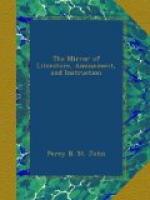JOSEPH MASON.
* * * * *
Another.
What we have been and what we are,
The present and the time that’s
past,
We cannot properly compare
With what we are to be at
last.
Tho’ we ourselves have fancied forms,
And beings that have never
been,
We unto something shall be turned—
Which we have not conceived
or seen.
G.H.
* * * * *
MARY QUEEN OF SCOTS.
(For the Mirror.)
The ensuing letter, though very short, discloses one or two instances connected with a subject of unfading interest—the death of Mary Queen of Scots. It need hardly be stated, says an able writer on this subject, that Queen Elizabeth’s conduct with respect to the execution of Mary was a mixture of unrelenting cruelty, despicable cowardice, and flagitious hypocrisy; that whilst it was the dearest wish of her heart to deprive her kinswoman of her existence, she attempted to remove the odium of the act from herself, by endeavouring to induce those to whose custody she was intrusted to assassinate their prisoner; that when she found she could not succeed, she commanded the warrant to be forwarded; and that when she knew it was too late to recall it, asserted that she never intended it should be carried into execution, threw herself into a paroxysm of affected rage and grief, upbraided her counsellors, and first imprisoned and then sacrificed the fortunes of her poor secretary, Davison, one of her most virtuous servants, as a victim to her own fame, and the resentment of the King of Scots. These damning facts in the character of Elizabeth are too well known to require to be dilated on; they have eclipsed the few noble actions of her life, and remain indelible spots on her reputation as a woman and a sovereign. But we learn from this letter the humiliating effects made by her ministers to appease her fury, and her implacable resolution to overwhelm the unfortunate Davison with the effect of her assumed, or perhaps real repentance. In his apology, that statesman informs us, that on the Friday after Mary’s execution, namely, on the 10th of February, arriving at the court he learnt the manner in which the queen had expressed herself relative to the event; but being advised to “absent himself for a day or two,” and being, moreover, extremely ill, he left the court, and returned to London. Woolley’s communication being dated on Sunday, (the manuscript is so excessively badly written as to be almost illegible,) shows that Elizabeth did not summon her council, and evince her displeasure at their conduct, until Saturday, the 13th of February, two days after she was informed of Mary’s fate. Davison had been attacked with a stroke of the palsy shortly before, and all he says of his committal is, that he was not sent to the Tower until Tuesday the 14th, on account of his illness; though some days previous (probably on Saturday the 10th) the queen assembled her council.




